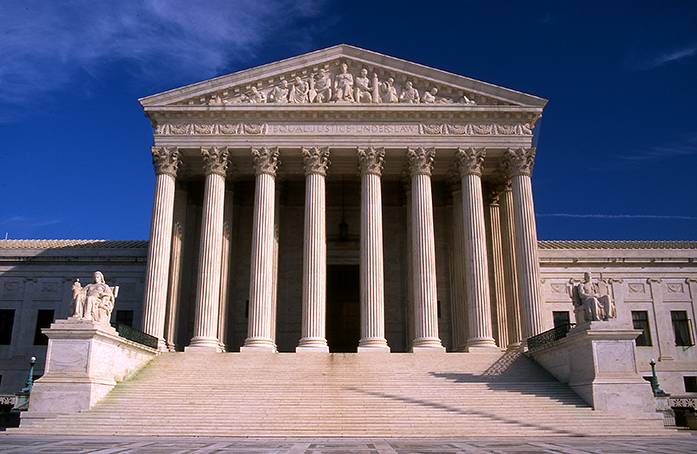Jack Dugan
[email protected]
The Supreme Court and its almighty justices are seemingly all powerful, cosmic denizens, philosopher kings, appointed for life to a position of absolute power and absolute knowledge. Do lawyers tremble in their $30,000 suits when they present before them? Yes, they must.I imagine crimson robes, third eyes, cufflinks engraved with little pyramids and little eyes illuminated at the top. I imagine they meet in dark rooms, with nine mysterious soft lights hovering above them, beneath which they methodically debate. After eons, one ultimately ascends to a celestial realm of total knowledge, only to return to our earthly realm and bestow upon us the cosmic decisions of landmark cases. Yes, that is what I imagine with I think of the supremely Supreme Court of the United States of America.
But the reality is, the Supreme Court, with its seats as coveted and influential as they are, is inherently just another mechanism of the political machine, another political facet of headaches, pandering, and the constant Republican and Democrat push-pull politicization of any and all things governmental. Because of this, and their dedicated opposition to anything Obama, Republicans have vowed to block any nomination until his successor takes the oval office.
The politicization of the court, loathed by some, was inevitable or simply just natural. Almost every major political event has had some encounter with the court, most of which culminated to and was solved in the courts. I hear ghostly grammar-school echoes in my head of Roe v. Wade, Miranda v. Arizona, and Brown v. Board of Education. Issues that divide the parties such as reproduction rights and same-sex marriage are two glaring and contemporary examples of the necessary politicization of the court.
But, the job must be done. Last week, President Obama officially nominated Judge Merrick Garland for late Justice Antonin Scalia’s seat. Garland seems to be an incredibly steadfast, intelligent, and objectively qualified man for the job. He is widely known and admired in legal circles and political circles across Washington, D.C.
The New York Times describes him as such: “Throughout, Judge Garland’s opinions were models of judicial craftsmanship — unflashy, methodically reasoned, attentive to precedent and tightly rooted in the language of the governing statutes and regulations. He appears to apply Supreme Court precedents with punctilious fidelity even if there is reason to think he would have preferred a different outcome and even where other judges might have found room to maneuver.”
Obama could have, knowing full well of the staunch Republican opposition, nominated an individual less fit for the job but more beneficial to the Democratic Party in the upcoming elections, but he didn’t. Why?
It’s a testament to his entire presidency, constantly maneuvering around the vicious politics of Congress. With this undeniably rational and level nomination, he is trying force Republicans to work with him rather than against him. As Jeffry Toobin writes in the most recent New Yorker, the president “appears to believe that any problem can be solved, and any mission accomplished, by intelligent people working together for a solution.” It’s apparent the president, at the end of his tenure, just wants what is good for that nation that he has grayed his hair leading. Perhaps that is something we can all strive toward or learn from, regardless of which campaign sign happens to be planted in your front yard.



